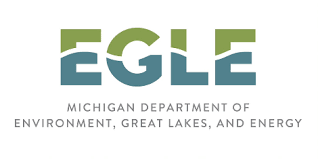Since 2006 the Clean Boats, Clean Waters program has been educating Michigan boaters about aquatic invasive species with trained volunteer boat inspectors. New funding from the Michigan Department of Environment, Great Lakes, and Energy and the Great Lakes Restoration Initiative has enabled Clean Boats, Clean Waters to grow into a comprehensive aquatic invasive species boater outreach program. The program’s mission remains the same: to prevent new aquatic invasive species introductions and limit their dispersal from water recreation activities through outreach and engagement. The reinvented Clean Boats, Clean Waters program promotes understanding of boat cleaning practices and regulations through the distribution of educational materials, an online resource library, boat washing demonstrations, grants and partnerships.
Michigan State University Extension is leading the effort to refresh and implement the new Clean Boats, Clean Waters program in cooperation with the Michigan Department of Environment, Great Lakes and Energy. The reinvented Clean Boats, Clean Waters program builds upon existing partnerships with statewide and local partners including the Michigan Lakes and Streams Association, Cooperative Invasive Species Management Areas and lake associations and is actively seeking new opportunities and partnerships to share the clean, drain, dry message.
 |
 |
 |
Preventing the spread of aquatic invasive species is easy
- CLEAN boats, trailers and equipment.
- DRAIN live wells, bilges, ballast tanks, and all water by pulling drain plugs.
- DRY boats and equipment.
- DISPOSE of unwanted bait in the trash.
Learn how to identify and report aquatic invasive species through the Midwest Invasive Species Information Network.
Aquatic Invasive Species News from MSU Extension
-
Cold weather kills pond duckweeds, until spring
Published on December 6, 2018
Late fall brings many complaints of weeds in ponds, but cold temperatures kill most for the winter. -
Celebrate Lakes Appreciation Month by committing to learn more about Michigan’s lakes
Published on July 30, 2018
Register today for the Michigan Inland Lakes Convention. -
Keep classroom pets out of the wild
Published on June 4, 2018
At the end of the school year, prevent the release of invasive plants and animals into the environment by following RIPPLE recommendations for proper handling and disposal. -
Pasture ponds, horses and algae. Oh my!
Published on April 4, 2018
Protect your livestock from potential illness carried in pasture ponds. Protect pasture ponds from erosion and contamination caused by livestock.







 Print
Print Email
Email